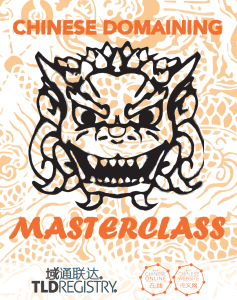 TLD Registry, the registry of Dot Chinese Online (.在线) and Dot Chinese Website (.中文网) top level domains, is releasing the fifth installment of their Chinese Domaining Masterclass blog series.
TLD Registry, the registry of Dot Chinese Online (.在线) and Dot Chinese Website (.中文网) top level domains, is releasing the fifth installment of their Chinese Domaining Masterclass blog series.
TLD Registry presented the world’s first, and still currently the world’s only Chinese Domaining Masterclass, at the industry-leading domain investing conference, NamesCon 2015. After several months of research, development, writing, and refining, they created a 120-page curriculum for western domain investors to use as a resource to help them confidently invest in Chinese-specific domains, without knowing a single word of Chinese.
I attended the “Chinese Domaining Masterclass” in NamesCon and I wrote a blog post about it: 10 Things I Learned About Chinese Domain Names.
Now, TLD Registry is releasing portions of the acclaimed and sought-after masterclass curriculum to the general public, in the form of a blog series, focused on providing tips and tricks to help you invest in Chinese IDNs, again, without knowing anything about the Chinese language.
The first installment was about Chinese numerics, specifically, the number seven. The second one was about the number three. The third was about the number 4. The fourth was about the number 8. The fifth was about the number 9.
Today’s topic: “The Number Five (5)”
5: 五; Pinyin: Wǔ
In terms of understanding the meaning of numbers in the Chinese context, the number five is one of the least ambiguous numbers for westerners to understand. Its meaning is fairly straightforward and doesn’t present the same kind of confusion or ambiguity that other numbers seem to carry, like eight or seven.
The best way to describe the number five’s meaning in the Chinese context would be with one word: balance. In ancient Chinese tai chi, the number five lies in the middle of all numbers. In the masculine principle of Yang, five being in the middle symbolizes perpetual balance.
The Mandarin spelling of the number five, as outlined above, is “wǔ.” The Cantonese spelling of the number five is “ng.” The most common, and also one of the most important sound-a-like’s for the number five is “me,” “myself,” and “I.”
- The noun [n.] sound-a-like’s for the number five is: a room, dirt
- The verb [v.] sound-a-like’s for the number five is: to lack, to accuse falsely, to dance, the sound of crying
- The adjective [adj.] sound-a-like’s for the number five is: not to have, none, my, to associate with, disobedient, martial
Please read the rest of the very interesting article here.
In the meantime, you can take advantage of the free Chinese domain spinning tool over at ChineseLandrush.com. At ChineseLandrush.com, there are hundreds of free, premium-level Chinese domain suggestions made by real live native Chinese speakers, refreshed often, that are available at normal retail registrar “General Availability” prices.
 OnlineDomain.com Domain Name News & Opinions
OnlineDomain.com Domain Name News & Opinions


 OnlineDomain.com - © Copyright 2012-2025 - All Rights Reserved
OnlineDomain.com - © Copyright 2012-2025 - All Rights Reserved